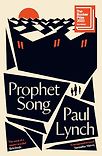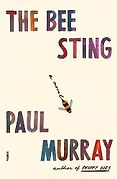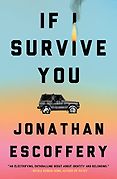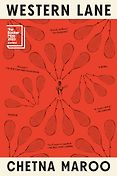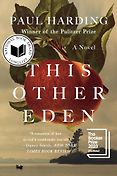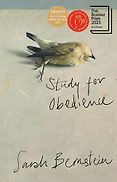This year’s Booker Prize judging panel was headed by Canadian novelist Esi Edugyan, a past Five Books interviewee who has herself been twice-shortlisted for the prize. She was assisted by the actress Adjoa Andoh, poet and critic Mary Jean Chan, the Shakespeare scholar James Shapiro, and the actor Robert Webb. Here’s a brief round-up of the six books they have selected as the best novels of 2023.
Paul Lynch’s Prophet Song
The winner of the Booker Prize is notoriously difficult to predict, but this year’s favourite was always Paul Lynch’s darkly foreboding novel set in a dystopian, semi-familiar Ireland. It opens with a knock on the door from the newly formed secret police—and soon our protagonist’s husband, a trade unionist, has disappeared and she is left to face her family’s uncertain future alone. Lynch has explained that the novel grew out of his anxieties in the post-Trump, ‘post-truth’ era: “I wondered about how the real is no longer real, how misinformation and disinformation have led to a decline in trust in traditional sources of authority. I wanted to understand where all this might lead,” he said. “Prophet Song took shape as a dystopian ruse that seeks to explode the form. How can such a novel be speculative when what is happening on these pages belongs to the here and now?” The Booker judges said it was “a shocking, at times tender novel that is not soon forgotten”; it has “one of the most haunting endings you will ever read.”
Lynch, an Irish novelist based in Dublin, has published four previous novels and has won several major awards, including the Kerry Irish Novel of the Year for Grace (2017) and France’s Prix Gens de Mers for a translation of Beyond the Sea (2019). Prophet Song reportedly took him four years to write: it is presented as a block of text, without paragraph breaks, and the prose has a propulsive, lyrical quality that is challenging but readable. One for fans of Cormac McCarthy‘s bleaker work—an excerpt from The Crossing appears as an epigraph.
Paul Murray’s The Bee Sting
Informed observers also had their eyes on Paul Murray’s tragicomic family saga The Bee Sting, in which we view the world through the eyes of four members of the Barnes family in a revolving carousel of perspective that has seen the novel compared to the work of Jonathan Franzen. Imelda’s first love died tragically in a car accident; heartbroken, she found herself marrying his brother in his place. Dickie assumed the role of his dead sibling in other ways too, taking on the family business and living in denial his homosexual identity. Cass and PJ, their teenage children, are busy with their own identity crises as their bewildered parents break down. “The characters are unforgettable,” declared the Booker judges. “They persist with hope and are capable of startling moments of love and generosity, despite their myriad flaws and problems.” The Guardian declared that “you won’t read a sadder, truer, funnier novel this year.”
The Bee Sting is Murray’s fourth novel, and channels the same riotous teenage angst of his 2010 bestseller Skippy Dies, an unruly mystery set in an elite boy’s boarding school. That too was longlisted for the Booker. 2023 wasn’t Paul Murray’s year, but I wouldn’t be surprised to see him in the running again in future.
Jonathan Escoffery’s If I Survive You
This much-buzzed book of interlinked short stories that has already been nominated for a host of other prizes including America’s National Book Award, the NBCC’s John Leonard Prize, and the PEN/Faulkner Award. If I Survive You portrays members of a Jamaican family making their lives in Miami from the 1970s onwards; its eight-part structure makes it more of a fictional mosaic than a straightforward story. This prompted a little grousing over the book’s eligibility, although the Booker rules simply state that books under consideration should be “unified and substantial”—the family is the thread that binds Escoffery’s episodes together.
Despite its sometimes heavy subject matter—characters face poverty, racism, and tricky family dynamics—it has a “peacocking humor, capers, and passages of shuddering eroticism”, said The New Yorker: Escoffery’s inventive and experimental approach to fiction “is marked by ingenuity.” If you’d like to get more of a sense of the style, his story Pestilence is available online at Electric Literature.
Chetna Maroo’s Western Lane
The book that jumped out at me, personally, from the shortlist this year was Chetna Maroo’s strange, sparse little novel about a Jain family living in Luton, England. In the aftermath of their mother’s death, the youngest of three daughters become fixated on the sport squash, spending hours training at a local sports centre with her father every day. Together they drive troubling thoughts of death from their minds with a regimen of drills, ‘ghosting’, sprints, and increasingly desperate matches. Although I’m not particularly athletic, I do have a soft spot for sporting novels—which tend to feature singular characters with obsessive mindsets and near-mystical descriptions of physical exertion. Though very different in terms of content, in style it reminded me of Sally Rooney thanks to its restrained evocation of complex emotions and fraught interactions.
In Western Lane, Maroo’s debut, we see squash as an act of sublimation. “In many ways, this intimate sport is loneliness itself,” noted Ivy Pochoda, former US squash champion and New York Times reviewer: “The game of squash becomes a way into Gopi’s grief and her attempts to process it. Only on the court does she have space to grieve alone, independent of her sisters, to submit to the void and find her footing within it.”
Paul Harding’s This Other Eden
There were three Pauls on the shortlist this year—what are the chances? Paul Harding won the Pulitzer Prize for his 2009 debut Tinkers. This new book, his third, is a work of historical fiction inspired by the true story of Malaga, an island off the coast of Maine where former slaves made their homes alongside Irish immigrants and Civil War veterans. The self-sufficient, racially-integrated community was disbanded by the US government in 1911 when the residents were evicted in the name of public health. “Terrible how terribly good intentions turn out almost every time,” as one character observes, prophetically—and sure enough this unique, rag-tag community is soon no more.
The Washington Post praised it as a “beautiful, brooding” book of “determined hope”: its “rich, unvarnished” portrait of island life is shaped by “long, cascading sentences [that] rush forward to encapsulate as much complexity as they can.” The judges said it was a “heartbreakingly beautiful” novel, noting that they were moved by Harding’s “the delicate symphony of language, land, and narrative.”
Sarah Bernstein’s Study for Obedience
Rounding off the 2023 Booker Prize shortlist is Scottish Canadian writer and literary scholar Sarah Bernstein’s unsettling, enigmatic second novel about a woman who moves to an isolated, northern town in another country to look after her brother after his wife leaves him. Soon the brother departs too, leaving her in a town where nobody likes her and where she does not speak the language. “I was not from the place,” the unnamed, unreliable narrator notes, “and so I was not anything.” It’s an allusive book that will reward the reader who does not seek hard answers to the uncomfortable questions that haunt this atmospheric text.
In mid-November, Study for Obedience won the $100,000 Scotiabank Giller Prize, Canada’s most prestigious prize for fiction. Bernstein was also recently flagged by Granta as one of Britain’s best young novelists; you can also find a short extract from this book on the Granta website, if you’d like to get a flavour of the book before committing.
November 25, 2023. Updated: December 4, 2024
Five Books aims to keep its book recommendations and interviews up to date. If you are the interviewee and would like to update your choice of books (or even just what you say about them) please email us at [email protected]
Five Books interviews are expensive to produce. If you've enjoyed this interview, please support us by donating a small amount.

